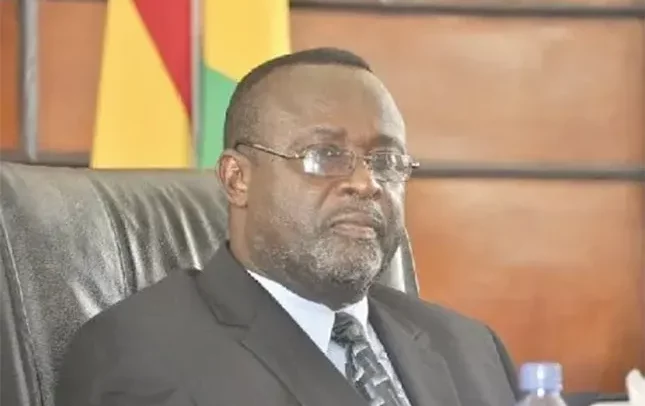Justices Paul Baffoe-Bonnie
The Supreme Court (SC) has dismissed two more applications seeking to halt the processes leading to the suspension of Justice Gertrude Sackey Torkornoo as the Chief Justice, describing both applications as being “unmeritorious.”
The court, in a 4:1 majority decision yesterday, dismissed the applications separately filed by the Centre for Citizenship, Constitutional and Electoral Systems (CenCES), a civil society group, and a private citizen, Theodore Kofi Atta-Quartey.
CenCES, in its application, had argued that the processes leading to the suspension of Justice Gertrude Torkornoo as the Chief Justice were in contravention of the 1992 Constitution, particularly Articles 17(1), (2), (3), 23, 296, and 146(1), (2), (3), (4), and (6) of the Constitution.
The group also averred that the steps taken by the President lacked due process and violated the standards of fairness, non-discrimination and lawful administrative actions required by the 1992 Constitution.
Theodore Kofi Atta-Quartey, on the other hand, is seeking the nullification of the entire proceedings arising from and relating to the petitions submitted for the removal of the Chief Justice particularly, as well as the determination of the prima facie case by the President with the advice of the Council of State, the suspension of the Chief Justice, and the establishment of the Committee of Inquiry.
The Supreme Court on May 6, 2025, by a 3:2 majority decision, dismissed an application which sought it to order President John Mahama to revoke the suspension of Justice Gertrude Torkornoo as the Chief Justice.
CenCES Motion
Moving the motion on behalf CenCES, their lawyer, Jacob Acquah-Sampson urged the court to injunct the work of the committee probing the petitions, pending the determination of the substantive suit because the setting up of the committee was done in breach of the constitution.
He averred that the suspended Chief Justice was not even supplied with the purported prima facie determination of her suspected wrongdoing by the President in consultation with the Council of State.
“We say that the Chief Justice is the holder of high office under the constitution, and that high office is not mandated to be taken away without following due process, and we describe that as a right at law. She has a right at law to insist that due process must be followed,” he argued.
He added that it is only an injunction from the Supreme Court that will hold the threat to her legal right in abeyance until the determination of the writ.
Kwabena Adu Kusi, counsel for Justice Torkornoo, sided with the applicant but went further to state that there was no prima facie determination made against the suspended Chief Justice, adding that if there was, it would have been made available to the court.
“If prima facie determination was indeed made, then in law there should have been reasons assigned to the prima facie determination. The determination of prima facie by the President is a quasi-judicial process and when you do so, you assign reasons…There is a requirement for reasonableness. The absence of reasons makes it impossible to say that the determination was reasonable,” he added.
The Deputy Attorney General, Dr. Justice Srem-Sai disagreed with the assertions, arguing that there was indeed a prima facie determination and same had been given to the persons entitled by law to be supplied.
He added that the steps taken have followed all the process by law and case law, and there is no basis for the application.
He also challenged the constitutionality of the applicants attaching confidential documents relating to the petitions, and touched on how the court could verify the authenticity of those documents.
The Supreme Court, in a 4:1 majority decision with Justices Paul Baffoe-Bonnie, Issifu Omoro Tanko Amadu, Yonny Kulendi, and Henry Anthony Kwofie forming the majority and Justice Yaw Asare Darko dissenting, dismissed the application for lacking merit.
Second Injunction
Joseph Afrifa, counsel for Theodore Kofi Atta-Quartey, in moving the motion argued on the face of the writ that there is indeed a serious question that ought to be tried and that on the balance of convenience, it would be favourable that the court granted the application for injunction which seeks to protect the fundamental provision of the constitution.
He premised his argument on Article 146 which lays out the procedure for the removal of the Chief Justice, and chapter 11 which seeks to insulate the process from unfettered discretion by the actors involved.
Mr. Afrifa added that the continuation of the removal process of the Chief Justice, particularly the work of the committee without a Constitutional Instrument guiding their work, will continue the illegality.
Dr. Srem-Sai opposed this application too, indicating the Supreme Court has on many occasions held that there is no serious injury to be caused to the plaintiff if such an application is not granted.
He added that the court has also held that the absence of a regulation does not nullify the process.
The same panel of judges, in a 4:1 majority decision, dismissed the motion for being unmeritorious.
BY Gibril Abdul Razak


